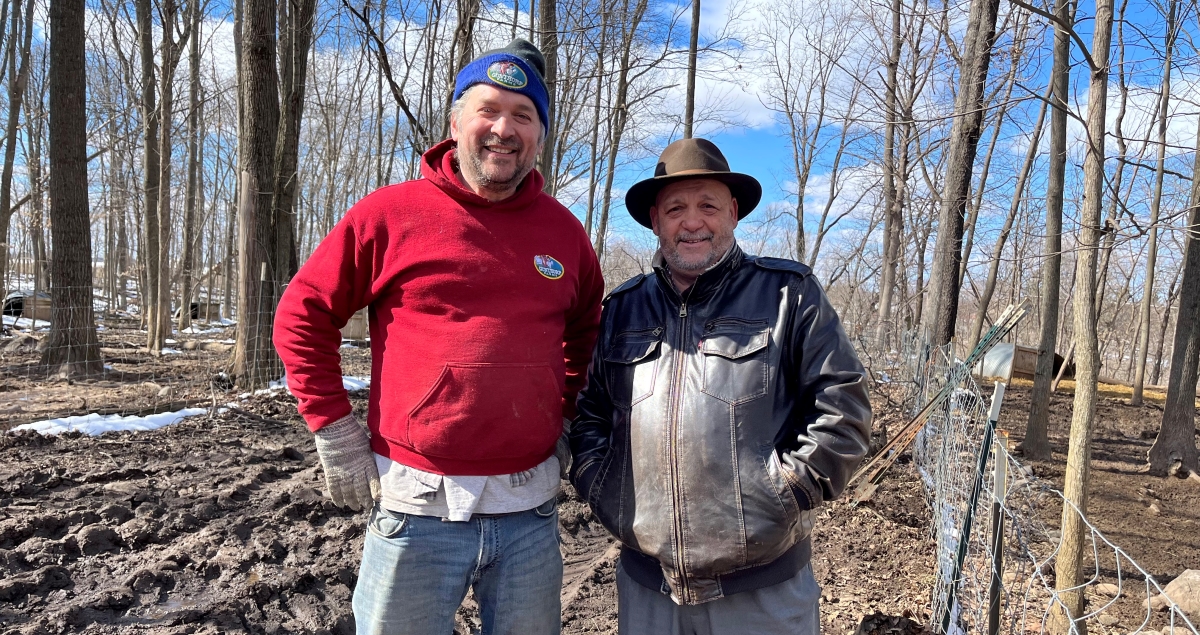Pigs Over Profit at Gunthorp Farms: Purchasing Pasture-Raised Meat at Trine University
- by Elise Kulers

Farmer Greg Gunthorp (left) poses with Bon Appétit at Trine University General Manager Joe Gentile (right)
Unlike most farm animals raised in the U.S., Greg Gunthorp’s turkeys, pigs, ducks, and sheep will never know the inside of an industrial livestock house. Instead, they spend their days outside on pasture, running amongst the trees in the rolling hills of Northeast Indiana.
It was a sunny day in early spring when Trine University General Manager Joe Gentile and I, joined Greg Gunthorp for a tour of Gunthorp Farms, one of Trine’s long-time Farm to Fork partners. As a fourth-generation farmer, Greg described how his approach to raising animals has remained the same as his great grandfather’s. Back then, most animals were raised completely outdoors, without the use of antibiotics or growth hormones, with the freedom to graze on grasses and seeds while naturally fertilizing the soil. While much has stayed the same at Gunthorp Farms, a lot has changed in the rest of the industry since Greg’s great grandfather farmed.
For starters, the number of independent livestock farmers has drastically declined over the last few decades, due to consolidation and struggles to stay afloat in an industry with slim margins. The pork industry alone has seen a decline in the number of pig farmers of over 90% over the last 50 years. Defying the odds, Greg has managed to make a name for himself in pasture-raised meat in the Midwest by connecting with farm-to-table restaurants in Chicago since the late ’90s. This remains an important part of his business, but he’s expanded to other cities and wholesale outlets, including Bon Appétit accounts like Trine University in Angola, Indiana.
Because Gunthorp chooses to raise their pigs, turkeys, and other animals on pasture, it requires a lot of individualized attention and labor. As Greg led us around the farm, we watched a litter of tiny, energetic piglets run around the enclosure, only a few weeks old, darting in between trees but never straying too far away from their mother. As they get older, they’ll have to be rotated to a different fenced area, ensuring that piglets of varying ages aren’t kept in the same pen.
While turkeys are raised seasonally (taking a break for the winter), pigs are kept outdoors year-round. Under the protection of a curved metal roof, pigs huddle up together in bales of straw during the coldest days of the year. This impacts how quickly they can grow, as they devote energy to keeping themselves warm. This trade-off between efficiency and quality of life is one example of the additional time and care it takes to raise animals on pasture, but the Gunthorps’ commitment to humane practices has earned them one of the strictest third-party welfare certifications in the industry, Animal Welfare Approved.
In addition, I learned that Gunthorp is one of very few (if not the only) independently owned livestock farms with a USDA-inspected on-site processing plant for red meat and poultry in the nation. In use since 2004, they are able to exercise a high degree of quality control all the way from the field to the kitchen, and they can sell their products across state lines. This has provided them with greater freedom and flexibility than other small and midsize meat producers, who are increasingly limited in their access to processing facilities.
As we walked through the plant, we saw all kinds of specialized equipment to package and label products or turn butchered meat into value-added products like a grinder for sausages, a smoke house to make smoked meats, a super-fast bacon slicer, and a giant sous vide machine. The biggest struggle of midsized producers, Greg explained, is that they have to do it all! They require so much capital-intense equipment to remain diversified and profitable, yet for those same reasons they struggle with efficiency and the tradeoff between labor and machinery costs.
Greg’s thoughtful approach extends to an ecologically-sound method of waste management, choosing to work with nature rather than against it. He showed us their “constructed wetland,” a wastewater treatment system made up of gravel, plants, and pipes. Wastewater and byproducts from the processing plant are purified as it flows through the system over the course of several days to replenish groundwater free from pathogens and debris. Greg proudly shared that a recent study by Purdue University found that the water returns to the ground cleaner than 70% of the world’s drinking water.
Given Gunthorp’s high standards for quality, welfare, and sustainability, and location just a few miles away from Trine, it’s no surprise their relationship with Bon Appétit has remained strong over the past eight years. Greg expressed gratitude that General Manager Joe Gentile and the team at Trine have been one of their most reliable university partners. Trine students and staff enjoy the Gunthorps’ turkey, pork sausages, and other pork products in Whitney Commons. The relationship goes beyond purchasing, too: each fall, Greg comes to Trine to roast a whole hog for a big annual event to welcome students and staff back to campus.
Gunthorp Farms is unique in many ways, but what makes them truly special is their holistic approach that looks beyond profit as the only metric to guide their decision-making. Greg remarked, “If economics were out of the equation, everyone would be farming this way.” For the many benefits they provide to people, the planet, and their pigs (and more), it’s easy to understand why.